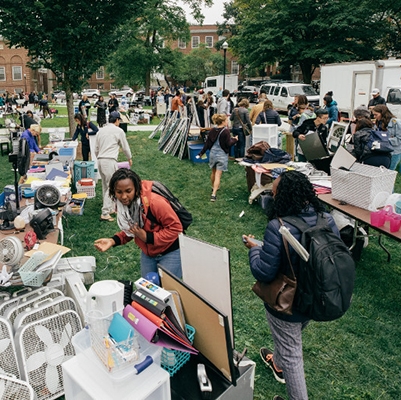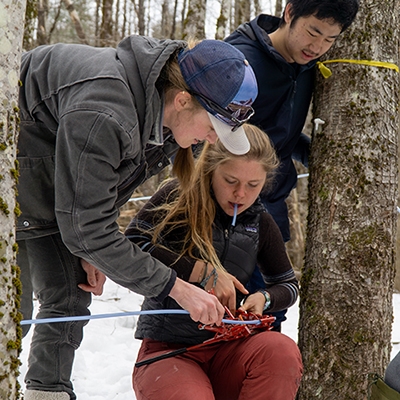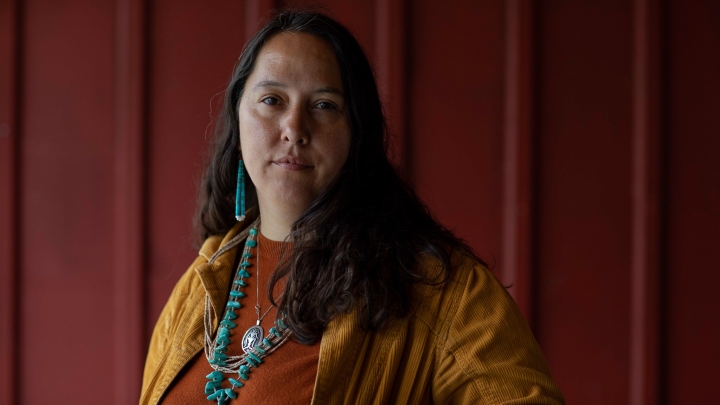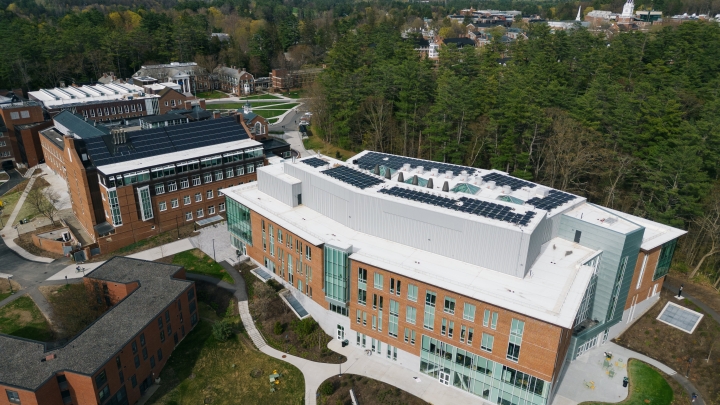With the oldest collegiate outing club in the world and woodland properties spanning thousands of acres across New Hampshire, students quickly understand the value of sustainability. Students first experience Dartmouth's commitment to sustainability when they are about to embark on their first-year trips, where any scrap of unfinished food is composted. When their trips lead them outdoors, be it hiking, canoeing, fishing, or even cabin camping, they really begin to understand how connected Dartmouth is to nature. This might be a change for some at first, but it becomes a part of students' everyday lives.

Dartmouth has made it their goal to rely on 100% renewable energy by 2050. From FOCO's (the 53' Commons Dining Hall) use of reusable food containers to students who enhance their experience with a major or minor in Environmental Studies, the campus works together to achieve this ambitious goal.
At the Dartmouth Sustainability Office students are engaged in weekly Sustainable Action Workshops, hear from experienced guest speakers, and are connecting over collaborative dinners. Sustainability internships are available to undergraduate students each term, and Dartmouth's Organic Farm is a perfect place for students to get their hands dirty. Activities like beekeeping, tapping maple syrup from sugar maple trees, and sustainable fish farming allow every interested student to engage with the natural world.

Students interested in reducing their environmental footprint can also live in the Sustainable Living Learning Center. Immersed in a health-conscious community, residents practice practical skills and various approaches to sustainability, like managing the house's garden or learning how to cook using sustainable ingredients for the center's weekly Sunday dinners. But what is even greater than that (yes, greater than food) are the students who are then better equipped to handle present and future real-world environmental problems; the student pursuing an Environmental Studies major who devotes his whole life to renewable energy, or the student pursuing an Economics major who devotes her whole life to strengthening environmental policy - they strive to keep the Earth alive and healthy.
I'm a bio major and premed. I lived here because it feels like a different community on campus. I've been here for three terms and I love it, even though I didn't know much about it going in. But honestly, it's been one of the best things I've done at Dartmouth. People here are great. People here are from all over the school. It's a very diverse crowd. You don't have to drop everything you're doing that isn't sustainable. You do it in a way that's easy to incorporate into your life. You're not going to stop showering. It's all relative to you. —Wyatt Genasci Smith '19
A lot of the sustainability minded-green groups on campus can use this space as sort of a base. Sustainable practices are applicable to every major and every field you're going to learn about in college. Ultimately, it's something everyone has to be striving for no matter what discipline you're involved in. —Ethan Smith '20, Engineering Major

As an exemplar model of what thriving in nature is like in contemporary times, Dartmouth encapsulates progress toward a sustainable, green environment. Students and faculty at Dartmouth recognize that the planet is changing, and as such, they endeavor to provide research and innovation to better the world. Integrating sustainability programs strengthens campus initiatives so students can experientially learn about how their actions can impact the environment. Amidst such an inclusive community on campus, Dartmouth nurtures leaders who will transform the world.
Big Green News Feed
The Irving Institute, along with other funders, is supporting student research.
Featured on our Blog
Exploring the Book Arts Workshop with fellow blogger Brendilou Armstrong! Follow us as we take a study break during the last week of the winter term.




